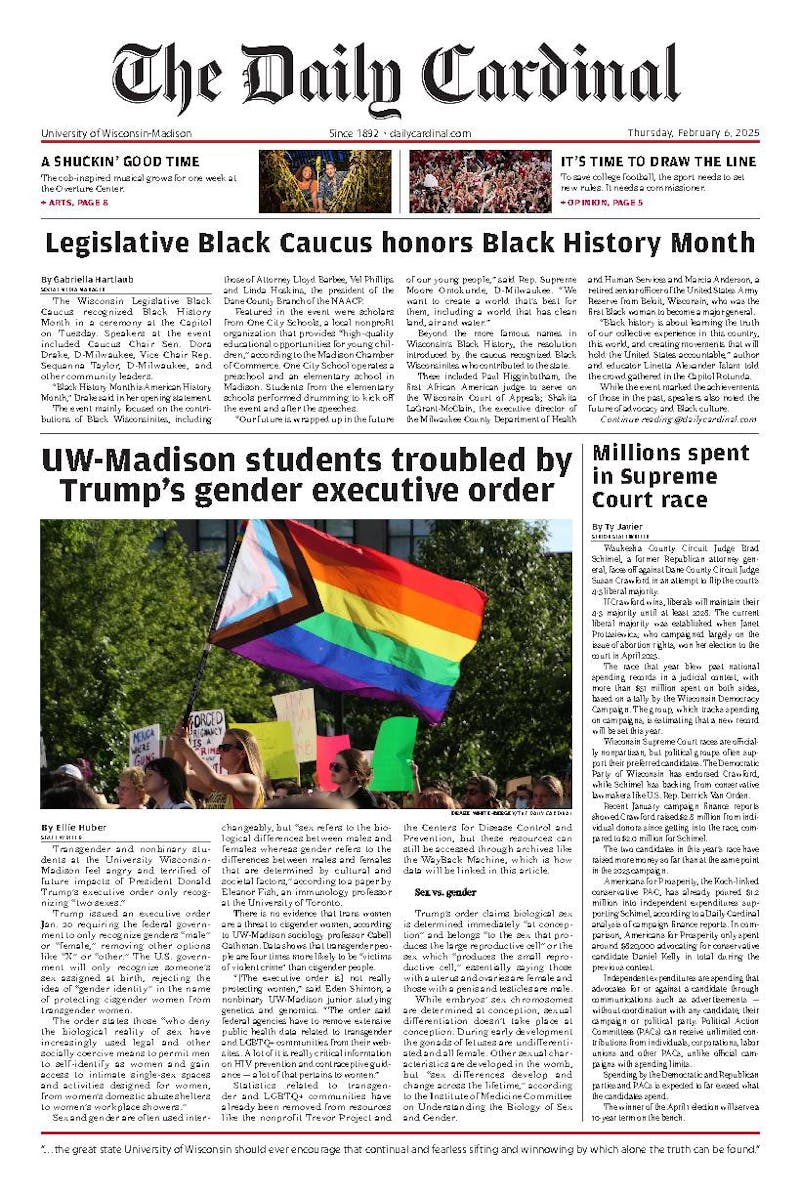As of today, I have 895 friends on Facebook. I also have an embarrassing number of pictures—864, to be exact—dating from my 15th birthday up until this very weekend. Furthermore, if one were to explore my listed information, he would find multiple e-mail addresses, a list of my favorite music and movies and even a vague description of my political and religious beliefs. To the right of my profile, I see advertisements for sperm donors, Nature Valley granola bars, ""FIFA 11"", and ""Pimped Out Housing at UW.""
The uneasy amount of access that third-party advertisers have to my personal information is astounding. And I am not alone. Well over 500 million people across 95 countries have Facebook accounts, up from 34 million just two years ago. We log on every day to keep up with friends, share information and satisfy our thirst for social interaction.
Facebook has evolved into a facet of socialization far beyond anything the world has ever seen. We evaluate the quality of real-life events in relation to their potential as a Facebook status. Our romantic lives are now measured in our relationship statuses, for unless it's ""facebook official,"" it simply doesn't count. And of course the ridiculous amount of photographs, fueled by a generation infatuated with self-documentation, ensures that every moment will be remembered.
But to describe Facebook as simply a popular form of communication does not properly encompass its significance. Social networking has transcended communication, uniting reality with our computer screens. Our Facebook profiles are now an extension of our being, so that our interactions online carry consequence in reality. Our obsession with the website is a result of our need to feel connected. This need questions whether we use our profiles as a tool for aiding our lives, or if we now live our lives so that they may exist within the screen.
Behind this phenomenon is a 26-year-old billionaire named Mark Zuckerberg, who invented Facebook while attending Harvard. Zuckerberg's recent portrayal in ""The Social Network"" is unflattering, especially in light of recent controversy over accusations of privacy violation by the website. Facebook currently collects the personal information provided by its users and sells that content to third-party companies, allowing them to target extremely specific consumer markets. This incredibly valuable tool treats the Facebook population like a farm of information, ready to be stored and sold to the highest bidder.
The revenue-creating potential of the site is enormous, but even more staggering is the power Facebook has to network and facilitate information.
Chris Hughes, one of Facebook's co-creators, chose to leave the company early to design a social networking site for Barack Obama's 2008 presidential campaign. The website, heavily connected to facebook, allowed users to communicate and plan rallies of support, attracting a young voting population and playing a central role in the senator's grassroots campaign. Chris Hughes' work is considered by many to have single-handedly won the presidential election.
Across the world, Facebook is becoming an essential tool for organizing movements, spreading information and aiding freedom of expression. The potential effect of such widespread communication is why countries like China and North Korea have banned the website, fearing its ability to rally anti-government support and uprisings. In 2009, 10,000 protestors filled the streets of Moldova to protest their communist government, organized through communication via Facebook and Twitter. In Iran, staged protests have relied on communication through Facebook and other social communication sites in light of their government's ban on other forms of contact.
This phenomenal power is what makes Facebook so significant. In an era of social network dominance, Mark Zuckerberg's creation stands above the rest. Five hundred million people have provided him with a key to their lives, and he has the ability to reach his hands through the screens of millions, influencing our ability to communicate and interact with others. As the gatekeeper of information, Zuckerberg has the frightening capability to control our exposure, taking full advantage of our addiction.
Luckily for us, the enormous amount of power we have bestowed upon this 26-year-old is completely dependent on our participation. His influence is only as strong as the popularity of his website, and thus we have the power to keep check on the many violations of privacy committed by Facebook in the last year. Selling our personal information to corporations so that they may track our actions and target our interests threatens our right to confidentiality. And while personalized ads may seem harmless, such intrusions open the door for further violations of privacy and identity theft.
Whether or not we care remains to be seen. Facebook is growing exponentially every day, and new ways to profit from our personal information are always under development. For now, our addiction to its communicative potential overpowers our collective fears and doubts. And although the website provides an invaluable way to stay connected with friends and circulate information and ideas, our generation needs to consider the consequences of pouring our lives into a system in which we hold no control.
Miles Kellerman is a sophomore with an undecided major. Please send all feedback to opinion@dailycardinal.com.






